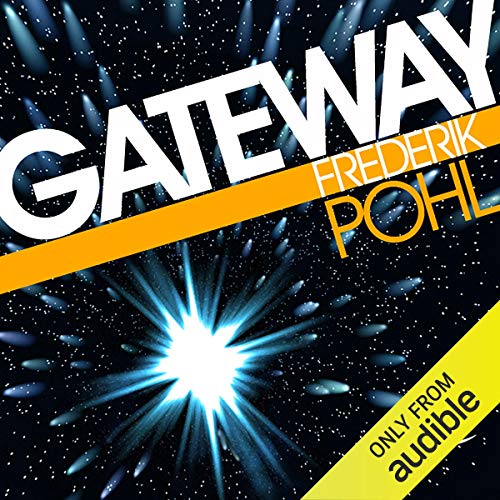At heart a psychological drama which explores one man’s attempts at dealing with the negative aspects of existentialism (what Sarte called “nausea”), Gateway nonetheless utilizes the tools of science fiction for effect. Less than 300 pages, the tropes of each are blended perfectly in succinct fashion so as to satisfy the readers of both genres.
After finding an abandoned alien base deep in an asteroid, humanity has learned the basics of piloting the remaining spaceships. Emphasis on the word “basics,” not all the important details of light speed have been mastered, with the result that people are sent shooting into space as “prospectors,” not knowing where the coordinates they’ve set will lead or if they’ll even make it back to the base. For those who do come back, reward is not a guarantee, either. Alien artifacts can help a person become rich, but as so few come back with any, is it worth the risk of dying alone in space?
 Into this roulette wheel lifestyle comes the protagonist, Robinette, a man who feels he has nothing to live for on earth, so why not take a chance in the stars. Told in alternating chapters, the reader takes turns absorbing the third person details of Robin’s time on the base and in space and his sessions with a computer psychologist that take place an unknown time after. Not as corny as it sounds, Pohl plays the computer psychologist/A.I. off well — nothing predictable or preachy about technology in the machine’s nature. So unimportant to the story, the question could be asked whether it was not human after all. The third person narrative and flashback style sessions moving closer as the book progresses, the climax offers a satisfying conclusion to the story.
Into this roulette wheel lifestyle comes the protagonist, Robinette, a man who feels he has nothing to live for on earth, so why not take a chance in the stars. Told in alternating chapters, the reader takes turns absorbing the third person details of Robin’s time on the base and in space and his sessions with a computer psychologist that take place an unknown time after. Not as corny as it sounds, Pohl plays the computer psychologist/A.I. off well — nothing predictable or preachy about technology in the machine’s nature. So unimportant to the story, the question could be asked whether it was not human after all. The third person narrative and flashback style sessions moving closer as the book progresses, the climax offers a satisfying conclusion to the story.
Feeling lost and purposeless, Pohl’s tale of a man lost is as human as stories come. The fear and paranoia Robin experiences not knowing whether this will be the end each time he launches in one of the alien vessels serves to drive him deeper into uncertainty regarding life. His love life, sense of direction, and even grip on reality all become drastically skewed the more time he spends in space. A parody on the state of affairs in the US when the book was written (1977), Pohl’s post-modern story of a man equivocating in an increasingly subjective world transcends the science fiction setting to comment directly on a state of affairs, that, if anything, has only become more relative in the decades since.

As such, Pohl took aim, fired and hit a bulls-eye from a thematic point of view. Robin, the blue-collar anti-hero caught in a web of his own design — alcohol, sex, drugs — and his attempts to free himself from the world of choice strike a chord with modern society. Despite the spaceships flying around and alien artifacts, this is what makes the story true literature. Secondary themes include the value of pain and suffering and exploitative nature of capitalism.
Short and sweet, Gateway comes recommended for those enjoying science fiction with depth and purpose.
~Jesse Hudson
![]() Intense, dramatic, emotional, exciting. The audio edition read by Oliver Wyman and introduced by Robert J. Sawyer is excellent.
Intense, dramatic, emotional, exciting. The audio edition read by Oliver Wyman and introduced by Robert J. Sawyer is excellent.
~Kat Hooper





Thank you for reminding me how much I liked this book! I think Heechee Rendezvous and Beyond the Blue Event Horizon continue the story, is that correct?
Ahh, Marion, you’ve caught me off guard. The only other book of Pohl’s I’ve read is Starburst. It is such a strange book that I was put off the author for a while. Gateway is so good, however, that should I see something else of his available on the cheap, I’ll pick it up.
Perhaps some of the other viewers of this site can confirm or deny Gateway’s sequels?
I know this comes (almost) five years too late, but here goes anyway: Beyond the Blue Event Horizon and The Heechee Rendezvous (in this order) are indeed sequels to Gateway. There’s also two short stories colections, called The Annals of the Heechee and The Boy Who Would Live Forever